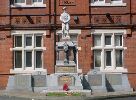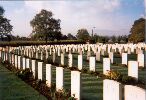
Newton-le-Willows and
Earlestown War Memorial

| OTHER WARS |
 |
Newton-le-Willows andEarlestown War Memorial |
 |
| The
Great War Roll of Honour |
|||||||||||||||||||||||||
Earlestown on Monday night was the centre of a scene absolutely unprecedented in its history. The primary cause was, of course, the bitter feeling that has been gradually growing stronger against German aliens throughout the country-a feeling which reached fever heat on the day following the sinking of the "Lusitania," gathered in intensity on the Sunday, and then, when Monday's papers told the tale of how Liverpool had set the example on Sunday evening, it rose to such a height here that there was no containing it, and on Monday night it reached delirium point.
The feeling was intensified during the course of Monday by a rumour which
was circulated to the effect that the 4th and 5th South Lancashire Regiments
had been badly cut up as a result of the use of asphyxiating gas by the Germans.
The names of prominent St. Helens officers who were supposed to have been
killed passed from mouth to mouth, and this probably brought about the climax.
It was freely talked about during the day-time, was the one subject under
discussion at the various works from morning until night, and it was an open
secret that something was to be attempted during the course of that evening.
Anti-Germanism in Earlestown centred almost entirely on one point, and that
was the shop over which has hung for some months-since, in fact, a similar
but less serious affair caused its appearance-a Union Jack. This was the establishment
of Mr. Reiss, Earlestown's most highly patronised pork shop. Mr. Reiss has
been a most inoffensive citizen for anything anyone knows to the contrary,
and has for many years been a naturalised Britisher, but the human passion
is a dangerous thing when roused, and such events as the dastardly deed of
Friday night are calculated to arouse the passions of everyone against all
things Germanic. Earlestown proved no exception and all respect for a tradesman
of long standing was thrown to the winds by the more antagonistic section
of the crowd-perhaps we should say in extenuation of the circumstances, by
those who have friends and relatives themselves in danger of suffering (or
who have already suffered), at the bands of the Germans.
We have said it was an open secret that trouble was afoot, and it was soon
evident that the police were well aware that there was to be work for them
that evening, for Bridge street was well patrolled, and the people kept on
the move. Towards eight o'clock it became necessary to suggest to many women
with shawls over their heads that they must seek other pastures besides Bridge
Street, and the juvenile element, after one attempt with a drum, found the
street to them "banned and barred, forbidden fare." This soon resulted
in a living barrier stretching across each end of Bridge Street, down which
only innocent and quiet-looking citizens were allowed to make their way, and
perhaps one in every half-dozen of these bore in his coat (you could see it
if you looked close) the badge of the special constable. The police did their
work quietly, thoroughly, and with the good humour that meant that after all
they could sympathise with outraged feelings, if they could not allow a disturbance
against the law' and for over two hours the strange state of affairs reigned,
with the living barrier at each end of the street gradually assuming larger
proportions. The crowd cheered and sang while they waited, and once or twice
there was a break through as some vehicle opened a pathway, but the constables
firmly closed in again, and the advance of the tall figure of the Inspector
with his subordinates who were within the prescribed area sent those who had
got through scurrying back again.
But law and order is not the only force that can boast of ingenuity, and stones
and bricks began to fall from somewhere in the neighbourhood of the shop in
question, which (it being the butchers' early closing day) had been closed
since noon, and the fact became known that people in Back Bridge were "aiming"
over the roofs of the shops opposite. Mr Riley had partly boarded up his window
adjoining the shop of Mr. Reiss, and on the other side Mrs. Devereux, by lowering
the outside shop blind, was able to protect her window from stones thrown
in this way. But the inevitable could not be kept up for ever, and at last,
as the sound of breaking glass was heard, from the Ram's Head corner there
was a rush, followed immediately by a break through the cordon at the other
end of the street. The police seeing that it was hopeless to try to drive
back the immense crowd, immediately formed up round the shop, but it was useless
to attempt to save the windows after this, and in a few minutes every pane
on the premises was shattered. This did not satisfy the crowd, and efforts
were made to rush and raid the premises, and the police had all their work
cut out to keep the people back. One agile individual managed to jump up and
catch the Union Jack, the pole, of which snapped, and he bore it off as proudly
as if he had captured a German flag at the seat of war.
How long the police would have held their own it is impossible to say. Edibles
that were in the window were snatched out in the rushes but the crowd could
not get a footing inside the premises.
Even these situations were not without their ludicrous touches. "Hey
up," said one woman to a "special," brandishing half-a-brick
in her hand, "Just let me heave this through them windows." "All
right," was the retort, "but mind you aim at Johnny Riley's, perhaps
you'll stand a chance of hitting Reiss's then." This was almost worthy
of Punch.
So the struggle went on until the hour of midnight had passed, and the whisper
went round that more police had been sent for from Leigh and were now on the
way. The crowd watching and participating, however, still remained a huge
one. Then came the next move. It was obvious that whilst the lights from the
shops on either side lit up the scene (for their own protection's sake) it
would be impossible to overcome the police, and the shout went forth "Lights
out." Thinking discretion the better part of valour, one shopkeeper promptly
obeyed, but before anything else could happen the muffled tread of a band
of fresh police reached the ears of those on the outskirts of the crowd, and
possibly thinking the strange policemen might not show as much forbearance
as those whom they saw daily, the word was no sooner passed round than the
crowd melted away like snowflakes at the appearance of sunshine, and towards
one o'clock the gentlemen in blue were in undisputed possession, and able
to make arrangements for boarding the premises up.
Such was the beginning and end of Earlestown's anti-German riot.
The premises have, it is needless to say, since been the object of much curiosity.
The signboard has been taken down and there is nothing now left to provoke
the anger of those who do not like to see a German name flourishing in their
midst.